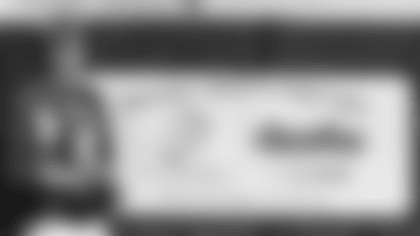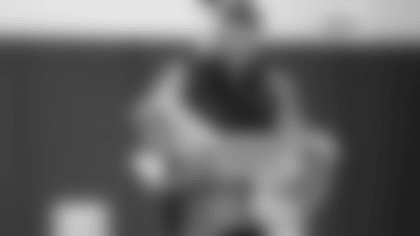The New England Patriots are celebrating International Women's Day on March 8 by featuring the stories of five hardworking women across the organization and the vastly different roles they perform. Patriots.com interviewed Executive Vice President of Football Business and Senior Advisor to the Head Coach Robyn Glaser, Football Communications Strategist Stephanie Burnham, Manager of Business Development & External Affairs Kassie Epstein, Assistant Sports Dietitian Sam Couture, and Software Engineer Emily Capprini about their experiences working in sports.
There's a common situation young women working in the NFL sometimes experience in solidarity with one another.
The topic of where they work will come up during small talk with a stranger or an inquiry from a taxi driver, and the typical assumption that they're a cheerleader. Jokes about it also surfaced a few times as Patriots.com interviewed five of the team's female employees for this feature.
Stephanie Burnham: "I remember being at an NFL stadium and walking onto the field and hearing someone say about me, 'Oh, look, there's a cheerleader."

Kassie Epstein: "I get that all the time. If I'm ever in a scenario where my job or my occupation comes up, it's always, 'Oh, are you a cheerleader?' That is a role, absolutely, but it's not the only role. There are so many other ways that you can be involved."
Rarely, these comments are made or taken with any offense.
Women didn't always work in football, and many on the outside don't realize how much it takes to run a professional sports franchise, or how many vastly different roles make up the support staff contributing to a team's success.
Their skill sets are unique, and so are the individual journeys they took to get where they are today.
Kassie Epstein: "There's certainly still work to do, but it's so amazing that there are so many different roles that young women can see other women in that aren't just a cheerleader or a sideline reporter. Those are amazing roles, but not the only roles.
There are so many facets of every organization that you can find your niche. There's so much that goes on here."
Epstein joined the organization in 2008 out of Boston College.
Epstein worked two internships with the organization and never looked back, progressing through the organization to her current role as the Manager of Business Development and External Affairs for Gillette Stadium. In that capacity, she oversees all large-scale events coming into the building, including the summer concert series.
This career wasn't necessarily on Epstein's radar while growing up in Wellesley, Mass. She thought she would be a teacher up until college, but as she learned, not everything goes according to plan.
Kassie Epstein: "I grew up in a big sports family, so that's always been a big piece of it, but I never thought I could work in sports. It just never crossed my mind. I studied psychology and theology in college, but my best friend interned with the Patriots.
Seeing her work in that internship and hearing about what she did just lit a spark. I never thought I could work in the industry, but it sounded so exciting and fast-paced and interesting. My two passions when I was younger were sports and music. I did a lot of different choruses and choir groups, so this is a unique role that kind of combines both of those things and doesn't necessarily exist at other stadiums."
Epstein is not alone in ending up at Kraft Sports + Entertainment without any prior goal to work in sports.
Robyn Glaser grew up just down the street from Foxborough in neighboring Sharon, Mass. She was aware of the Patriots, of course, but didn't consider herself a big football fan until she began working for the Kraft family.
As of a recent promotion, Glaser serves as the Executive Vice President of Football Business and Senior Advisor to Patriots head coach Jerod Mayo. She's been with the organization since 2007.

Robyn Glaser: "If you asked me in my 20s if I believed I would end up working in the NFL, I would tell you that's about the same possibility that I would be a neurosurgeon, so it's kind of amazing."
After undergrad at Colby College in Maine, Glaser simultaneously studied law and business at Washington University in St. Louis.
Influenced immensely by her family, Glaser knew she wanted to practice law, but not forever. Her entrepreneurial spirit was calling.
Robyn Glaser: "My father was a lawyer. My mother was a businessperson. I admired and aspired to be both of them."
Glaser's first job out of college was at Paul, Weiss, Rifkind, Wharton & Garrison – a prestigious global law firm with core practices in litigation and corporate law. At that point, there was just one female partner across the entire firm.
That was all she needed to see.
Robyn Glaser: "I remember thinking, I could still do that. Even though there's just one, that's enough representation to tell me that I could do it, too."
Glaser's career took her to the music industry in Los Angeles before a move back home to the East Coast, where people in her networking circle helped get her on Robert and Jonathan Kraft's radar. Though Glaser's background had nothing to do with football, they knew how much of an asset she would be to the organization.
Glaser now handles the business side of football – whether it's dealing with human resources, finance, budgets, staffing, contracts, compliance, legal matters or league relations – serving as a resource for Coach Mayo that enables him to focus on his job: building a culture and team to win football games.
Empowered in her role as an executive, Glaser is among many female role models working for the Patriots and showing other women what can be done.
Robyn Glaser: "I think my experience as a woman in sports is a little skewed because I'm a woman in the Kraft system, and the Krafts look for the best and most loyal people. Especially on the business side, I look around me and some of our strongest leaders and people handling some of our biggest projects are women. I celebrate that system."
As it's become more typical to see women working in sports, younger generations have set out to do so with examples to follow.

Emily Capprini: "I always knew I wanted to work in sports. I grew up in a big sports family. I always watched football on Sundays with my dad and have been involved in sports my whole life as well. This was something I knew I always wanted to do."
Still, it took until Capprini was in college for her to discover how she'd break into the industry.
Capprini was a swimmer at Trinity College in Connecticut, and in her freshman year, she took an entry-level software course that changed the trajectory of her life. In that class, she found a knack for coding and decided to pursue it, even if it meant letting go of her dream.
Ultimately, she didn't have to. As a Software Engineer for the Patriots, Capprini works on the internal application used by the team's scouts to gather information and evaluate talent.
Emily Capprini: "When I got to Trinity, I pivoted from focusing on trying to work in the sports industry to find a major I'd like to study. I happened on Computer Science and loved the coding aspect of it. I still had hope that one day I'd end up in sports and never gave that up. With this in mind, I ended up finding an internship with the Patriots. When I was job searching my senior year, I was continuously checking the Kraft Group website to see if there was ever a job posting. I saw the software development internship with the Patriots and I immediately applied."
Sam Couture has a similar story in how she grew up an athlete in East Windsor, Conn. and wanted to pursue a career in sports.
Initially, the Assistant Sports Dietitian entertained the idea of physical therapy but, at the time, was burned out from the experience of rehabbing her own sports injuries. Couture ended up finding her niche anyway, now entering her fourth season with the team

Sam Couture: "I peripherally discovered nutrition and then realized it could fit into sports. It felt like it was filling the void because I no longer wanted to do physical therapy, but could still be involved. I went to Boston College and did my best to shadow and do whatever I could in their small program, and then went to Purdue for graduate school where there was an established program. At that point, I was pretty sure this is what I wanted to do and that experience just confirmed it."
Couture planned to keep her options open and move anywhere to secure a job in sports, but when her path crossed with Purdue alum Ted Harper, the Head Sports Dietitian for the Patriots, it led to an eventual opportunity to come back home.
Sam Couture: "He was there for a distinguished alumni award. Knowing his connection to the Patriots, and me being from New England, I very much sought him out. We stayed in touch for three years, and when I officially became a dietitian, the timing just worked out because he was looking for an assistant. It was a lot of luck. Everything fell into place in a crazy, unexpected way that, honestly, I could have never seen coming."

Networking is a massive part of every woman's story and is something Glaser tries to instill in those she mentors.
Robyn Glaser: "I say to everyone, it doesn't matter if you're 12 years old or 38, whatever. Your most important job in life is to build relationships. That's your job. Everything else is secondary."
Burnham is a great example of this mentality.
Serving as a Football Communications Strategist in the football communications department, she joined the Patriots in 2021 after internships with the Los Angeles Rams, Chargers, and a stop at UCLA. Burnham's role includes media training, coordinating player and coaches interviews, facilitating all media credential requests, and on game days, she's the on-field PR contact.
It's a long way from Sydney, Australia, where she was born and raised as the youngest of four girls.

Stephanie Burnham: "Growing up, sports were just a big part of my life. I played soccer, touch footy, which is similar to flag football, and rowed crew in high school. I always loved rowing because I think the early mornings and the commitment you had to make to it helped me understand what determination was, and I took what I learned from rowing into my career. I was lucky to realize I wanted to work in sports from an early age. What I learned from sports, and especially the role I'm in right now, is that everyone has a story and I always want to help them be able to tell that, so people understand who they are and why they do it."
That's all easier said than done, though.
Burnham moved to Canberra, the capital of Australia, to get a degree in sports media. There, she had a pivotal realization.
Stephanie Burnham: "In my second year I realized I was one of only two girls who were starting off in the sports media degree."
It compelled Burnham to hit the ground running and accumulate as much experience as she could, working for a professional rugby union team as well as the official state field hockey team in Canberra.
One of Burnham's bosses, Gavin Hunt, shared stories of his travels and what he learned from professionals in the NFL and English Premiere League to take back home and improve Australian sports.
A lightbulb went off.
Stephanie Burnham: "I started reaching out on LinkedIn, and I probably connected with over 100 people working in American Sports and started messaging them asking to shadow. I think I got seven replies back. Two were a no, one resulted in a phone call, and the other four said, 'Yeah, come on over.'"
Burnham's dream of working in American professional sports sounded far-fetched to many back home, but that only fueled her fire.
To show how serious she was, Burnham planned a five-week trip to the United States to shadow in the organizations willing to give her an opportunity. She visited the Baltimore Ravens, Tennessee Titans, Jacksonville Jaguars, and even the Harlem Globetrotters' headquarters in Atlanta. On a separate venture to the U.S., she did a training camp internship with the Indianapolis Colts.
After repeated trips to the U.S. and back, and relentless networking, Burnham applied to a graduate certificate program at UCLA. This granted her an education visa that would allow her to work a part-time job with the school's football program.
Burnham leveraged that into back-to-back internships with the Los Angeles Chargers and Rams before being hired full-time by Stacey James, the Patriots' Vice President of Communications.

Stephanie Burnham: "I am the type of person who if you tell me there's something I can't do, I'm going to do it. If you tell me I'm not going to be able to work in the NFL, I'm going to work in the NFL. I'm a big believer that you go through life and face certain decisions. I am always asking myself if I'll regret it if I don't do something. That was the biggest part of my journey – knowing that if I didn't take this on, I was going to wonder what could have been if I hadn't taken those trips to the United States."
Like Burnham, all of these women took some risks to get where they are. Doing so required tremendous support and encouragement from their families and friends.
In Capprini's case, she had to start with the Patriots while finishing her senior year and swimming season. Even she had doubts that she could make it work, but managed to turn that internship into a full-time job.
Emily Capprini: "My dad told me I could make it work if this was something I really love, because I have great support around me to make it work. I went through the whole interview process, and they ended up offering me the position. My coaches and advisors at school were so amazing in helping me juggle both school and swimming with the Patriots. They helped me really tailor my senior spring semester so that I could do this internship and get a great experience while also finishing up at Trinity."
Stephanie Burnham: "My family has always been so supportive. I've always sent them some type of merchandise from any team I've worked at. But with the Patriots, my mom tells me often that she will be wearing her Patriots hat in Sydney and will get stopped, or she'll see someone else with one on and start a conversation. She'll ask if they're a fans and tell them her daughter works for the team. People react like, 'Are you serious, no way!'"
When telling her own story, Burnham makes sure to convey that she wouldn't be where she is without the support from her mother, Virginia, and three sisters, Samantha, Annabelle, and Juliet. At every point in her journey, they shared how proud of her they were, and it inspired her to keep going.
Burnham's father also served an important role in her journey as a confidant for career advice. He lived and worked in Switzerland for much of her life after her parents' divorce, but helped her fund one of those first flights to the U.S. to pursue her dream.
He passed away from cancer in August of 2016, just two months before she left for the trip.
Stephanie Burnham: "It's sad. He never got to see that I made it. So many people doubted my dream and I don't think he would have ever imagined I would have gotten here. Unfortunately, he didn't get to see it all work out, but he at least had a small part in the start of my journey."
The reality is, no one's story comes without sacrifice.
For everything it takes to support the development and performance of a professional athlete, not enough is said about how much time and effort the individuals in those support roles put in. The hours are long, and the journey is hard and competitive, but there's nothing like finally making it.
Sam Couture: "In terms of the work-life balance, I think something that's helped me is to take a step back and appreciate all the things I'm afforded despite the unconventional schedule. It isn't always easy, but how cool is it to be able to see the whole country or take international trips? Not that I'm not counting that as work, but it's a unique element of the job that I don't take for granted."
Kassie Epstein: "I remember the first day driving here, and when you come off Route 1 and Gillette Stadium kind of appears. I remember sitting in my car and thinking, 'I can't believe that this is my office,' right? I am driving up to this massive building, and in a small way, I get to be a part of this unbelievable thing. There's just so many pinch-me moments. I always tell people it's such a mix of absolutely glamorous moments that people get to see, and think 'Oh my God, you have the best job.' But there's also a lot of that work that people don't see that's the least glamorous stuff you could ever imagine. But I've been to Super Bowls, and I've been in so many rooms with people I never could have imagined. It's just so funny how things work out."
Emily Capprini: "I was just so excited – especially when I first got the internship. It was just so surreal because I had always wanted to work in sports. I had those pinch-me moments realizing I was actually here, doing exactly what I love in the industry I always wanted to work in. It's crazy."
Stephanie Burnham: "To know that I'm in the NFL right now is insane. I'm a woman from Australia and I'm working for the New England Patriots. Never would I have thought I'd make it here. It was a lot of work, but I always thought of it as an investment in my career. And now, whoever I speak to, I want to give back to other women looking to get into the league."
On game days, Burnham always makes it a point to wear her hair down. She wants little girls watching the game to see that representation on an NFL sideline.
In their own ways, each of these women does what they can to help those who will come after. Some benefited from seeing those role models at an early age, and others paved their own path.
Emily Capprini: "That's one thing I'm so grateful for, because my generation did have those trailblazers who helped lead the way. It's empowering to be a woman in sports, and I hope I can be an example for those to come after me."
Robyn Glaser: "Merit matters, and I can definitely try to stand on my own from a merit point of view. I've had some successes and some failures, but I feel confident in myself if I'm competing on merit. But sometimes it's also important to acknowledge that as a woman, opportunities come less frequently, and we rely a little bit more on advocacy and allyship, and things are a little bit harder. As a woman, it has to matter to me that I'm a woman in football. It just has to."







































